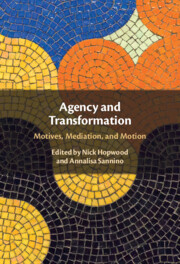Book contents
- Agency and Transformation
- Agency and Transformation
- Copyright page
- Dedication
- Contents
- Figures
- Tables
- Contributors
- Preface
- Acknowledgments
- Chapter 1 Motives, Mediation and Motion
- Chapter 2 Toward a Power-Sensitive Conceptualization of Transformative Agency
- Chapter 3 The Tasks of Reality and Reality As the Task
- Chapter 4 A Relational View of a Future-Orientated Pedagogy
- Chapter 5 From Future Orientation to Future-Making
- Chapter 6 Excluded Lives
- Chapter 7 Children’s and Youth’s Civic Projects and Responsible Agency
- Chapter 8 Decolonizing Agency
- Chapter 9 Unpacking Social Articulation of Agency
- Chapter 10 The Emancipatory Nature of Transformative Agency
- Chapter 11 Choice in Childbirth, Agency and Collective Action
- Chapter 12 Transformative Agency by Double Stimulation in an Ecological Agroforestry Association from Brazil
- Chapter 13 Transformative Agency and the Cultivation of Innovations in Frontline Homelessness Work
- Chapter 14 Children’s Agency during the COVID-19 Pandemic in China
- Chapter 15 Agency As the Direction and Reach of Actions
- Index
- References
Chapter 1 - Motives, Mediation and Motion
Towards an Inherently Learning- and Development-Orientated Perspective on Agency
Published online by Cambridge University Press: 23 November 2023
- Agency and Transformation
- Agency and Transformation
- Copyright page
- Dedication
- Contents
- Figures
- Tables
- Contributors
- Preface
- Acknowledgments
- Chapter 1 Motives, Mediation and Motion
- Chapter 2 Toward a Power-Sensitive Conceptualization of Transformative Agency
- Chapter 3 The Tasks of Reality and Reality As the Task
- Chapter 4 A Relational View of a Future-Orientated Pedagogy
- Chapter 5 From Future Orientation to Future-Making
- Chapter 6 Excluded Lives
- Chapter 7 Children’s and Youth’s Civic Projects and Responsible Agency
- Chapter 8 Decolonizing Agency
- Chapter 9 Unpacking Social Articulation of Agency
- Chapter 10 The Emancipatory Nature of Transformative Agency
- Chapter 11 Choice in Childbirth, Agency and Collective Action
- Chapter 12 Transformative Agency by Double Stimulation in an Ecological Agroforestry Association from Brazil
- Chapter 13 Transformative Agency and the Cultivation of Innovations in Frontline Homelessness Work
- Chapter 14 Children’s Agency during the COVID-19 Pandemic in China
- Chapter 15 Agency As the Direction and Reach of Actions
- Index
- References
Summary
Studies of agency are crucial if we are to grapple with pressing societal and environmental problems. Relevant conceptual and methodological solutions are needed to make alternative futures possible. This chapter outlines a broad position from which the subsequent contributions to this edited volume depart: one that recognises the urgency of agency and the value of cultural-historical perspectives in breaking away from problematic notions that frame agency as a matter of individuals pitted against the social, or in which individual actions lose their social contingency. Elaborating agency as a matter of struggle where individual and social are in dialectic relations, the chapter focusses on motives, mediation and motion. Within a broader and still-evolving cultural-historical framework, these motifs offer a distinctive way to deal with the challenges of conceptualising and facilitating agency, one which brings alternative futures into the realm of the possible by linking agency with learning and development.
Keywords
- Type
- Chapter
- Information
- Agency and TransformationMotives, Mediation, and Motion, pp. 1 - 34Publisher: Cambridge University PressPrint publication year: 2023



